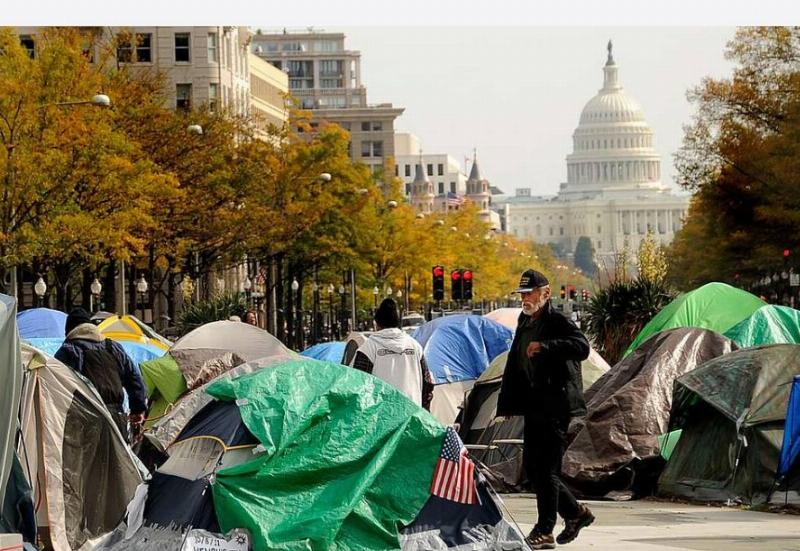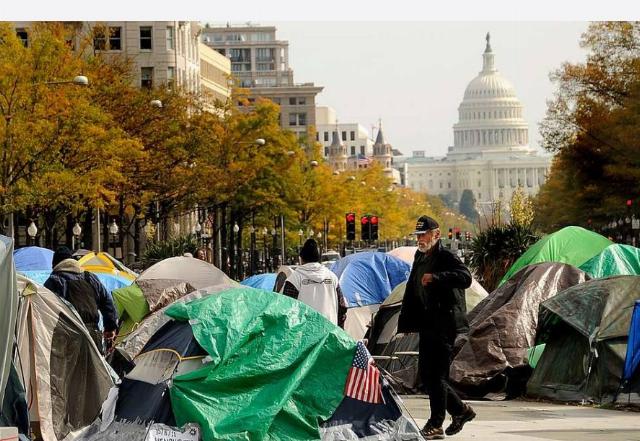


Part of President Trump’s federalization of D.C. law enforcement includes plans to remove homeless encampments from the city. You don’t have to go far to find them: come over from Virginia on the Roosevelt Bridge and turn towards E Street. They’re all over the Foggy Bottom neighborhood, from the State Department to the Kennedy Center.
Opponents of the cleanup plan will likely fasten on the “heartlessness” and “cruelty” of bulldozing tent cities and removing the homeless from the streets. No doubt there will even be those proclaiming it “unchristian.”
I disagree.
Catholic social teaching insists on the dignity of every human person and the primacy of the common good. This includes solidarity with those suffering. Yet solidarity does not mean tolerating social disorder or abandoning public responsibilities. Streets are meant for travel and commerce, not for setting up tents and sleeping rough.
“Who am I to judge?” some might ask. Well, you might be a public official charged with public safety and public resources, including public money. Don’t let a false virtue signaling decorated with a Biblical verse convince you otherwise.
Homelessness is a grave and complex social problem. It involves both economic hardship and public policy failures, particularly when that public policy is driven by piecemeal approaches which, depending on the trend of the day, accentuates one factor while letting others fall through the cracks. But homelessness is not solved by simply allowing the streets to become bedrooms.
When I was a graduate student at Fordham in New York, my weekend trip home took me through Port Authority Bus Terminal. Back then, New York treated Port Authority like Washington treats its streets: as provisional lodging for the homeless. That, of course, meant that commuters were deterred from using Port Authority unless they had to, not wanting to deal with its denizens. Were they unkind? Or did they rightfully react to their legitimate expectation that a New York City bus terminal’s purpose is to facilitate people entering and leaving the city, not housing the homeless and the mentally ill?
 One illustration: how we lost seats at Port Authority. Port Authority used to have benches for commuters to wait for buses, since if you missed one bus the next might arrive an hour later. But the benches were taken over as beds. To prevent that from happening, Port Authority removed the benches and installed a modern version of the medieval misericords. Misericords were narrow benches on a hinge sometimes installed in monks’ choirs. As long as the monk sat on the bench with his knees firmly against the floor, he was fine. But if he started falling asleep and his knees relaxed, the swinging misericord would unceremoniously dump him on the ground. That’s how Port Authority kept the seats from becoming beds for the homeless… while making them inconveniences for delayed commuters. Nothing quite like equal opportunity dysfunction!
One illustration: how we lost seats at Port Authority. Port Authority used to have benches for commuters to wait for buses, since if you missed one bus the next might arrive an hour later. But the benches were taken over as beds. To prevent that from happening, Port Authority removed the benches and installed a modern version of the medieval misericords. Misericords were narrow benches on a hinge sometimes installed in monks’ choirs. As long as the monk sat on the bench with his knees firmly against the floor, he was fine. But if he started falling asleep and his knees relaxed, the swinging misericord would unceremoniously dump him on the ground. That’s how Port Authority kept the seats from becoming beds for the homeless… while making them inconveniences for delayed commuters. Nothing quite like equal opportunity dysfunction!
Much of that nonsense ended with the Giuliani Administration, which brought some simple yet effective sense to public policy. Like the time to stop neighborhood decay is with the first busted windows. Like fare evaders likely have broken other laws, too. Like bus terminals are for commuters, not sleepers. Like streets are thoroughfares, not campgrounds.
Clearly, those messages have not been received in “home rule” Washington, which is why America’s City -- our national capital -- has become a dysfunctional place bedeviled by murder and violent crime while its “leaders” defend their failed social experiments. Instead of admitting D.C. has pursued a policy of what Senator Daniel Patrick Moynihan once called “defining deviancy down,” we are instead told that 187 murders per year -- one every 46 hours -- is proof “crime is decreasing!”
We do no one a favor by tolerating -- and should recognize there is no “right” to -- “rough sleeping.” Streets and parks are not flophouses.
Some will lament Trump’s efforts, waving the banner of “social justice.” But social justice is not about endless handouts or sanctioning disorder. It is about fostering a society where every person can live with dignity, responsibility, and safety.
That means recognizing difficult realities:
True charity requires resources and resolve to restore dignity through stable housing, mental health care, and employment -- not enabling squalor in public spaces. It is not resolved by handing out houses without personal conversion. This is not “anti-poor”; it is pro-human dignity. Streets must be reclaimed as public goods, places of commerce and community, not refuges for squalor.
The Gospel calls us to love the poor, but it also calls us to truth and order. Let us reject the false mercy that tolerates disorder and instead build a society where all can flourish. That may require a different approach to the homelessness problem from the status quo.
